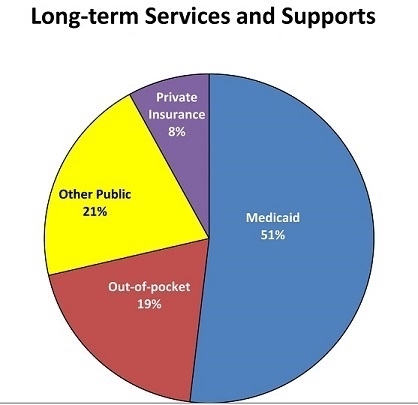
None of the programs that provide seniors with financial and health security are better off after four years of the Trump Administration. President Trump and his minions have undermined Social Security and traditional Medicare, and have left both programs in worse fiscal shape than when he took office. Medicaid has fared just as badly – or maybe worse – a target of the corporate, ideological conservatives entrusted with administering the program. Now, as the Los Angeles Times’ Michael Hiltzik reports, the Trump administration is taking parting shots at Medicaid on its way out of office.
Medicaid not only provides crucial health coverage to low-income Americans; it pays the lion’s share of long-term care services and supports for impoverished seniors. Without Medicaid, millions of seniors could not afford skilled nursing care – whether in institutions or in home/community care settings. Medicaid also ensures that financially challenged ‘near seniors’ (age 55+) can access affordable health care before they enter the Medicare program at age 65.

Medicaid pays more than half off the costs of all long-term care services and supports
The Centers for Medicare and Medicaid Services (CMS), under its director Seema Verma, apparently don’t believe in Medicaid’s core mission – a commitment by the federal government and the states to ensure society’s that least fortunate receive health care. In fact, Verma and her fellow ideologues have sought to weaken Medicaid through work requirements and experiments with block grants.
As Hiltzik observed in Thursday’s Los Angeles Times:
“Medicaid is second to none among government programs in the hostility it has attracted from the Trump administration. Virtually since Trump’s inauguration, he has taken steps aimed at throwing tens of thousands of Americans off the Medicaid rolls.” – Michael Hiltzik, Los Angeles Times, 1/14/21
Last fall, the administration approved work requirements for Medicaid in Georgia and Nebraska. Work requirements – a pet project of conservatives, including CMS administrator Seems Verma – have nothing to do with Medicaid’s mission, which is to provide health coverage for lower-income citizens who can’t afford it.
Contrary to the administration’s claims, work requirements impose unreasonable burdens on beneficiaries. As Hiltzik points out, work requirements “don’t reduce joblessness and they don’t improve people’s health.” Lower courts have already overturned such rules, but the Supreme Court will consider work requirements this term – which has health care advocates “scratching their heads.”
The administration has also championed block grants to the states for Medicaid, another policy idea promulgated by conservatives. Currently, the federal government matches state spending for Medicaid as their expenses fluctuate. But block grants would give the states fixed amounts of money, leaving them holding the bag as health care needs and costs fluctuate over time.
No matter, on January 8th CMS approved a block grant for Tennessee, under the false assumption that block grants would provide states more “flexibility” in administering their Medicaid programs.
Medicaid has been fulfilling its mission since it was signed into law 55 years ago. Health care advocates (and seniors’ advocates) know that if something’s not broken, it doesn’t need to be fixed. But corporatist politicians can’t seem to tolerate the government spending money to care for society’s most vulnerable. Former GOP House Speaker Paul Ryan was downright gleeful about the prospect of slashing Medicaid.

“We have been dreaming of this since I have been around, since you and I were drinking at a keg,” said Ryan in 2017 about the prospect of cutting Medicaid.
President Trump’s annual budgets called for cutting Medicaid by nearly $1 trillion. Fortunately, this administration is leaving office in less than a week, making way for a new President and new Congress who no doubt will strengthen – not undermine – the federal Medicaid program.


